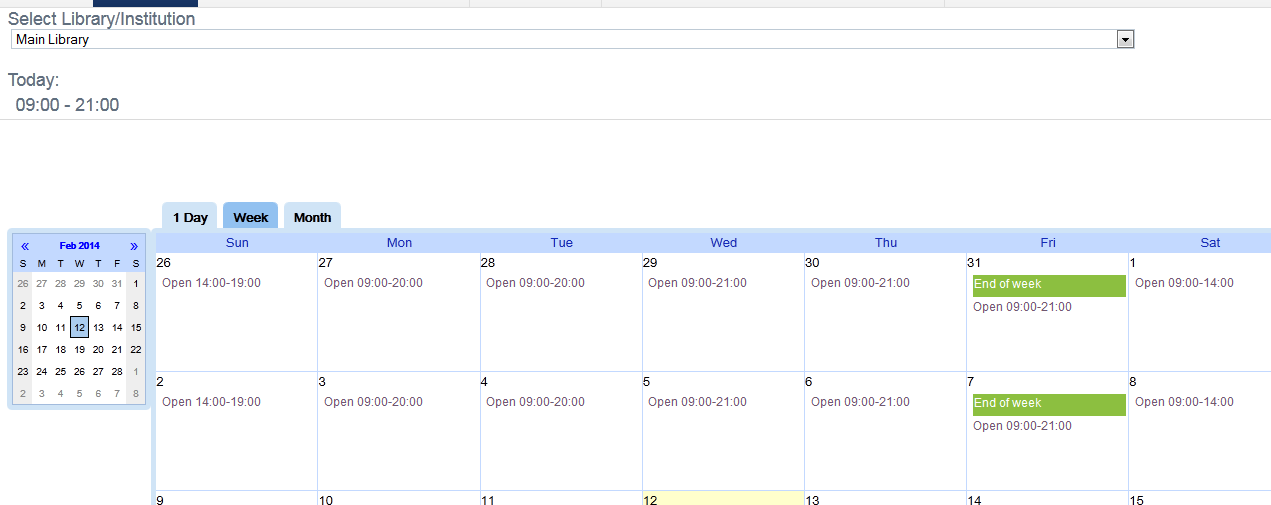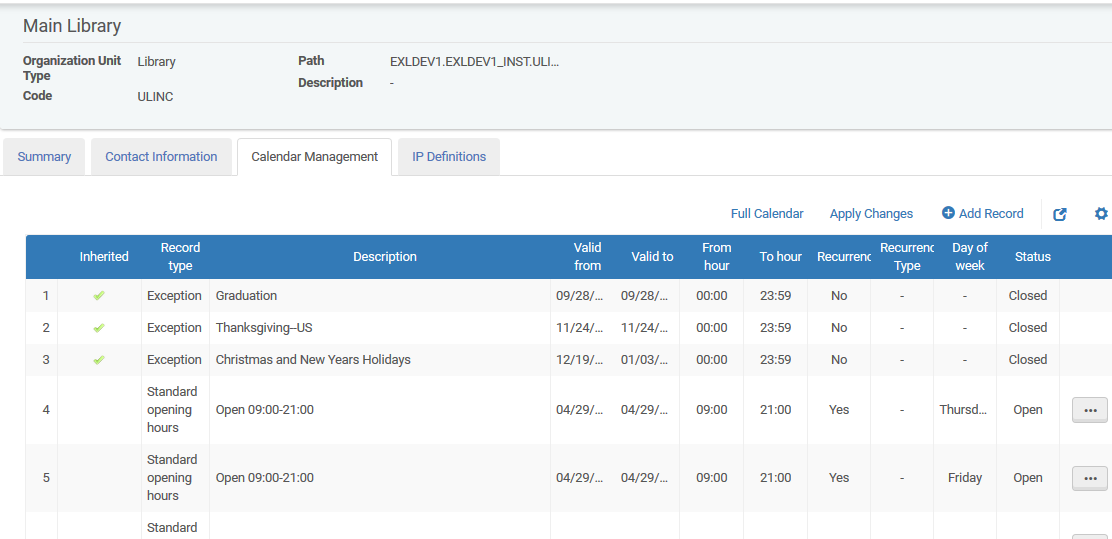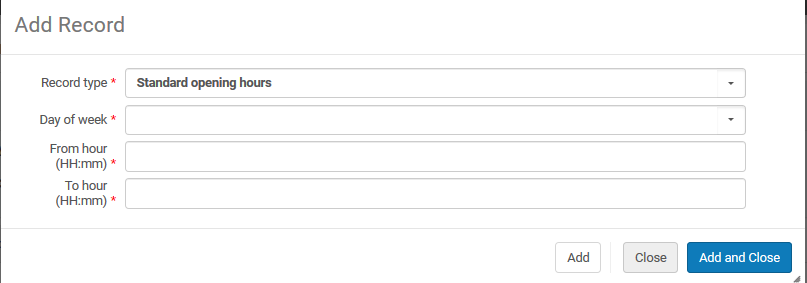Calendars
How does Alma manage multiple calendars?
Alma offers the option of defining a calendar of open and closed hours. Definitions can be on the level of the Institution, or on the level of the library. In addition, it is possible to define:
- Events – special dates, such as the end of the year or the end of the semester
- Exceptions – exceptions for open/closed dates and times, such as holidays
An event or an exception is defined on the Institution level and can be inherited by individual libraries.
The Standard Opening Hours are defined on the individual library level. In order to facilitate the adding the of the standard open hours at each individual library, the standard opening hours can be added via either an Excel sheet or an API.
In addition, the Terms of Use Policy includes a parameter for defining the behavior of due dates related to library hours and closures. For example, if an item is due when the library is closed, Alma can automatically change the due time to the upcoming closing time, the next open time, or leave the time as is. Similarly, booking requests are automatically adjusted by the system so that their start and end time be on library open time slots.
Can each library to define its own closed dates, term dates, opening hours, etc.?
The Standard Opening Hours are defined on the individual library level. Exceptions such as closures for a holiday period can also be added on the library level or can be inherited from the institution level. .
The following is an example of the calendar for the Main library:

In addition, it is possible to define:
-
Events – special dates, such as the end of the year or the end of the semester
-
Exceptions – exceptions for open/closed dates and times, such as holidays
If an event or an exception is defined on the Institution level, it will automatically be inherited on the local level, as can be seen below:

We recommend using format 23:59 instead of 24:00 to ensure that items due on a particular day are not confused with the following day.
How are special exceptions to standard opening and closing times defined?
Calendar records are categorized by:
-
Event – Special dates, such as the end of the year, the end of the semester, or an exhibition. Events appear in the library’s calendar, but do not indicate whether the library is open or closed.
-
whether the event recurs
-
the recurrence type, such as weekly or yearly – for recurring events only
-
the day of the week – for recurring events only (required)
-
a description of the event (required)
-
the date on which the record is valid (required)
-
the time of the event
-
the date until which the record is valid – for recurring events only
-
-
Exception – Exceptions for open/closed dates and times, such as holidays
-
the status, such as, open or closed (required)
-
the day of the week
-
a description of the exception (required)
-
the dates between which the record is valid (required)
-
the hours for which the record applies
-
Note that open exceptions are not viewed in the full calendar when viewing for the month but can be seen when viewing in one day mode.
-
Standard Opening Hours – Regular dates and times during which the library is open, based on a day of the week

 Fixed dates such as End of Term, End of Summer, End of Year, can also be defined.
Fixed dates such as End of Term, End of Summer, End of Year, can also be defined.-
the day of the week to which the record applies
-
the hours for which the record applies
-

We recommend using format 23:59 instead of 24:00 to ensure that items due on a particular day are not confused with the following day.
Fixed dates such as End of Term, End of Summer, End of Year, can also be defined.
What calendar specific parameters affect circulation policies?
Closed Library Due Date Management
How to manage fulfillment activities when the library is closed. The available options, displayed in the Value field of the Policy Details page when this policy type is chosen, are:
- Keep – Keep the current due date
- Move backward – Move to the end of the previous open day
- Move forward – Move to the beginning of the next open day
- Move to the end of the next open day (affects due dates that would otherwise fall on a day that the library is closed)
Due Date
The institution can set up due date policies regarding the length of time an item may be borrowed. You can specify the following period types for due date policies:
- Fixed – Based on your institution’s calendar, such as the End of Term.
- Non Fixed – Based on the date the item was borrowed. The following values are valid: Days, Exact Days, Hours, Minute, Month, and Week.
If you set the Unit of Measurement field to Days, Month, or Week, you can also specify a specific time. If you don’t specify a time, the default is your institution’s closing time.
Hold Shelf Period
The Hold Shelf Period value does not include days that the library is closed. For example, if the Hold Shelf Period value is 5 days and the library is closed for 2 days during that period, the 2 days are not calculated as part of the Hold Shelf Period
Total views:
12295
